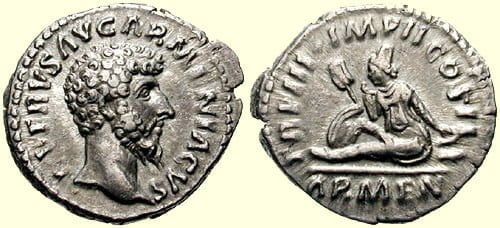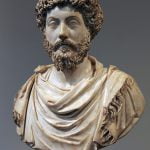Chapters
| Name | Lucius Ceionius Commodus Verus |
|---|---|
| Ruled as | |
| Reign | 161 – 169 CE |
| Born | December 15, 130 CE |
| Died | February 169 CE |
Lucius Verus was born on December 15, 130 CE in Altinum as Lucius Commodus, eventually taking the name Lucius Ceionius Commodus Verus. He was the son of Ceonius Commodus and Avidia. Commodus at the age of 40 was adopted by the childless Emperor Hadrian (136 CE) and was elevated to the rank of Caesar and anticipated heir to the throne. Unexpectedly, however, he died a few months before Hadrian in 138 CE In such a situation, the emperor decided to adopt Antoninus Pius, who would succeed him and forced him to adopt Lucius Commodus in 138 CE.
It is worth adding that the rule of the Antonin dynasty was characterized by the fact that the rulers decided to adopt future successors. They did so either because of the lack of male offspring or when potential candidates showed a good predisposition to the throne.
Verus’s adoptive brother was Marcus Aurelius (former name – Marcus Annius), with whom he co-ruled in 161-169 CE. This was the first case in the history of Rome when the country was ruled by two emperors.
Verus came from a wealthy aristocratic family, possessing goods mainly in Etruria. Verus and Aurelius were 8 and 17 years old on the day of their adoption. Despite the large age difference, they grew up together for some time in the care of the newly elected emperor and stepfather, Antoninus Pius. They had the same teachers who taught their passion for Greek and Roman literature. The emphasis was on teaching speech, writing poems and considering philosophical treatises. Ancient writers mention that Verus liked to compose poems, and he was even better at composing speeches. Still, he was not as talented a student as his older brother. In addition, like the ordinary young man at the time, he loved games, chariot races, hunting, and exercise. One could say that he was the opposite of Aurelius, who devoted himself to thoughts, studies and philosophy. Verus did not like administration, which made him less liked than Aurelius, who in turn was regarded as an exemplary future ruler. Verus was considered a playboy, but at the same time, he was a normal boy, not showing excessive negative or positive qualities.
Interestingly, many then considered Verus “another Nero”, due to the same day of birth – December 15. His passion for playing was noticed, which was also characteristic of Nero. It was feared that in the future Verus, being in a responsible position as the ruler, would not be able to bear the burden and would give himself to “rest”.
According to historians, he grew up to be handsome, well-built, with lush, light and curly hair. The nose had an eagle, typically Roman. In addition, he wore a lush beard, which was a fashion indicator of the time.
He put on a men’s gown at the age of 15, which was honoured by the games. He gradually took up more offices to become a consul at the age of 24. Antoninus Pius cared for each of his sons, but Aurelius was his favourite on the throne. In the end, he gave him the title of Caesar, which was a formal indication of his succession.
Co-ruler
On March 7, 161 CE, Emperor Antoninus Pius died. At the will of the deceased, the Senate transferred all titles and rights only to Marcus Aurelius. However, to everyone’s surprise, he asked that his brother be appointed a co-coordinator. Of course, the new ruler was not refused. Lucius joined his titular nickname of the brother – Verus – and officially became the first legal co-ruler in the history of Rome. Question why such a decision of an intelligent and sensible emperor-philosopher? There are different hypotheses. Some claim that to ensure the continuity of the throne in the event of his death (Aurelius did not yet have a descendant, only a few months later Commodus was born). He even connected Verus with close family ties, marrying him in 164 CE his daughter – Annia Lucilla. The choice of Verus as co-communist could also be due to his generosity. However, it seems most likely that he did so out of reason. Just as mentioned, Verus liked banquets, parties, and Aurelius himself was calm. Verus performed honours in receiving distinguished guests as emperor during the games. This situation suited both because after his death Marcus had to take over these responsibilities, which bored him and he considered a waste of time. It can be said that they both complemented each other well. In addition, the sheer magnitude of the empire could have forced Aurelius to seek a second pair of hands in controlling remote parts of the empire. It is worth adding that in these times the Roman Empire was fighting with the powerful party monarchy.
Rome’s disputes with the Party concerned, as many times before, Armenia, whose throne was taken over by the Parthian prince. To make matters worse, other vassal states separated from Rome; one of the Roman chiefs was killed and defeated in the battle, and the Parthians invaded Syria and defeated his governor. In this situation, a quick reaction of the emperor was necessary. He decided to send his brother and co-ordinator Verus to the East, who had no military experience but was young (31 years in CE 161) and had a predisposition to be a good leader. His advisers were many distinguished generals led by Avidius Cassius. In fact, it was expected that the mere appearance of the emperor in troubled lands would do the trick.
Verus was apparently in no hurry to travel. Along the way, he indulged in many pleasures and games. Arriving in Syria, he established Antioch, Daphne and Laodicea as his headquarters. However, when he arrived, he did not immediately go to battle. The exotic climate only increased his desire for games and games. He attended brothels, feasted abundantly, and made love with hetaerae. The emperor was to say: “(…) a wife cannot have sexual pleasure, this is not decent”. His behaviour resembled Nero’s, but fortunately, he did not persecute anyone. On the one hand, such conduct of the young Verus shocked the elite of Rome and Aurelius himself, but on the other, it was certain that Verus was not governed by full power. Thus, there was no threat of usurpation and civil war.
During the emperor’s pastimes, his leaders carried out victorious military operations. They drove the Parthians out of the empire and entered Armenia, Mesopotamia and Media. All these successes brought Verus new nicknames: Armeniacus, Pathicus or Medicus. The emperor himself was not on the battlefield. Finally, in 166 CE, a peace favourable to Rome was concluded. Verus returned to the capital reluctantly, having to give up many pleasures. Roman historians mention that the 36-year-old emperor was to take with him actors and musicians from the East who later took part in the triumphal march of both emperors. Aurelius also received the aforementioned nickname of Verus.
Unexpectedly, together with Verus and his victorious legions in 166 CE, a plague was brought to Italy, which first erupted in Seleucia, from where it spread to other provinces. It was one of the largest epidemics of the ancient world, if not the largest. The disease that hit the Empire is not known, but it is certain that it was extremely “murderous”. She deserted and deserted the lands of the empire, making it worse in the worst period when the northern borders of the empire were invaded by Germanic tribes. It was colloquially called the Antonine’s Scourge or Galen’s Scourge, and it spread throughout the Empire in the 165- 180 CE It is believed that it was either smallpox or measles. Scientists have estimated that 5 million people were probably killed as a result of the plague.
During the rage, the emperor Verus indulged in joy and carefree life. He organized feasts and games. He was an avid enthusiast of chariot racing and a supporter of the Greens. The famous horse of this team even lived to see a golden statuette that the emperor did not part with. When the animal died, he buried them in the Vatican.
Of course, Marcus Aurelius opposed his brother’s behaviour, but he did it violently. Once Aurelius was invited to a feast at the house of Verus, where for 5 days he focused on examining court cases. Marcus also hated many of Verus’s courtiers, which he reportedly said many times to his brother. Although Emperor Aurelius looked unfavourably at Verus’ behaviour and their characters were completely different, there was never an open conflict between them. In disputable situations, the younger brother gave way to the authority of the first emperor.
Meanwhile, in the autumn of 167 CE, the situation on the Danube border was dangerous. The fortifications were broken in many sections and there was a real threat of a strong flood of Germanic and Sarmatian tribes on the empire. The barbarians ravaged the Alpine and Pannonian lands, entered Italy and began the siege of Aquileia. For the first time in many years, the enemy stood on the Apennine Peninsula. Aurelius decided to act quickly. He set off with his wayward brother to Aquileia. Then, after the barbarians left the siege, he chased them across the Alps to the border. At this time, Verus, unlike his brother, did not focus on responsible tasks, but rather on hunting. When the border was strengthened he persuaded Aurelius to return to the capital. On the way back, going to Patavium (today’s Padua), near the town of Altinum, Verus suffered a sudden attack of apoplexy (stroke) and lost speech.
Death
He died in February 169 CE in Rome after three days of illness, at the age of 39. Marcus Aurelius ordered to bury his ashes in Hadrian’s mausoleum and forced the senate to include Verus as gods as Divus Verus. Verus was not significant or plunged. As he only co-ruled with his brother, his promiscuity and light morals were forgotten. This is largely due to Aurelius, who was valued for his reasonable rule and did not want his brother to discredit and talk. Lucius Verus was remembered as the first emperor, who showed no success, and the rebellious brother of the emperor-philosopher.









